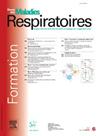Influence du tabagisme sur l’efficacité de l’immunothérapie dans les cancers pulmonaires de stade avancé
IF 0.5
4区 医学
Q4 RESPIRATORY SYSTEM
引用次数: 0
Abstract
Introduction
Le cancer du poumon est la première cause de décès dans le monde. Il survient majoritairement chez les fumeurs, mais dans 25% des cas chez les non-fumeurs. Pour les stades métastatiques, l’utilisation de l’immunothérapie a permis une amélioration de la survie globale, mais avec une potentielle influence du statut tabagique sur leur efficacité. L’objectif de cette étude était d’analyser leur efficacité en première ligne de traitement pour les cancers pulmonaires avancés non à petites cellules (CBNPC) selon le statut tabagique des patients.
Méthode
L’étude rétrospective porte sur l’ensemble des patients avec un CBNPC stade IV traité par immunothérapie en première ligne, seule ou en association, entre 2018 et 2019 dans 3 centres d’Île de France. Le critère de jugement principal est la survie globale (SG) selon le statut tabagique. Le critère secondaire est la survie sans progression (SSP).
Résultats
L’analyse incluait 105 patients (66,7% d’hommes) dont 38% fumeurs actifs et 9,5% non-fumeurs, ayant dans 65,7% des cas un adénocarcinome. Les médianes de SG et de SSP étaient de 17, 23,2 et 24,9 mois et de 4,9, 7,6, et 4 mois pour les fumeurs, ex-fumeurs, non-fumeurs, sans différence significative.
Conclusion
Dans cette étude, le statut tabagique ne semblait pas modifier l’efficacité de l’immunothérapie. Des études sur une population plus importante seraient nécessaires.
Introduction
Lung cancer is the leading cause of death worldwide. It occurs mainly in smokers, but also in 25% of cases in non-smokers. As regards metastatic stages, while immunotherapy has led to improved overall survival, smoking status may potentially influence its effectiveness. The objective of this study was to analyze its effectiveness as first-line treatment for advanced non-small cell lung cancers (NSCLC) according to patient smoking status.
Method
This retrospective study covers all patients with stage IV NSCLC treated with first- line immunotherapy, alone or in combination, between January 2018 and 2019, in three Ile de France centers. The primary and secondary endpoints were, respectively, overall survival and progression-free survival, according to smoking status.
Results
The analysis included 105 patients (66.7% men) of whom 38% were active smokers and 9.5% non-smokers, with adenocarcinoma in 65.7% of cases. Median OS and PFS were 17, 23.2, and 24.9 months and 4.9, 7.6, and 4 months for smokers, ex-smokers, and non-smokers respectively, without significant differences.
Conclusion
In this study, smoking status did not seem to modify the effectiveness of immunotherapy. Studies on a larger population are called for.
吸烟对晚期肺癌免疫治疗效果的影响
肺癌是世界范围内死亡的主要原因。主要发生在吸烟者中,但也有25%的病例发生在非吸烟者中。至于转移期,虽然免疫疗法提高了总体生存率,但吸烟状况可能会影响其有效性。本研究的目的是根据患者吸烟状况分析其作为晚期非小细胞肺癌(NSCLC)一线治疗的有效性。方法:这项回顾性研究涵盖了2018年1月至2019年3个法兰西岛中心接受一线免疫治疗的所有IV期非小细胞肺癌患者,单独或联合。根据吸烟状况,主要终点和次要终点分别是总生存期和无进展生存期。结果:纳入105例患者(66.7%为男性),其中38%为活跃吸烟者,9.5%为非吸烟者,65.7%为腺癌。吸烟者、戒烟者和非吸烟者的中位OS和PFS分别为17、23.2和24.9个月,分别为4.9、7.6和4个月,无显著差异。结论:在本研究中,吸烟状况似乎并未改变免疫治疗的有效性。需要对更大的人群进行研究。
本文章由计算机程序翻译,如有差异,请以英文原文为准。
求助全文
约1分钟内获得全文
求助全文
来源期刊

Revue des maladies respiratoires
医学-呼吸系统
CiteScore
1.10
自引率
16.70%
发文量
168
审稿时长
4-8 weeks
期刊介绍:
La Revue des Maladies Respiratoires est l''organe officiel d''expression scientifique de la Société de Pneumologie de Langue Française (SPLF). Il s''agit d''un média professionnel francophone, à vocation internationale et accessible ici.
La Revue des Maladies Respiratoires est un outil de formation professionnelle post-universitaire pour l''ensemble de la communauté pneumologique francophone. Elle publie sur son site différentes variétés d''articles scientifiques concernant la Pneumologie :
- Editoriaux,
- Articles originaux,
- Revues générales,
- Articles de synthèses,
- Recommandations d''experts et textes de consensus,
- Séries thématiques,
- Cas cliniques,
- Articles « images et diagnostics »,
- Fiches techniques,
- Lettres à la rédaction.
 求助内容:
求助内容: 应助结果提醒方式:
应助结果提醒方式:


